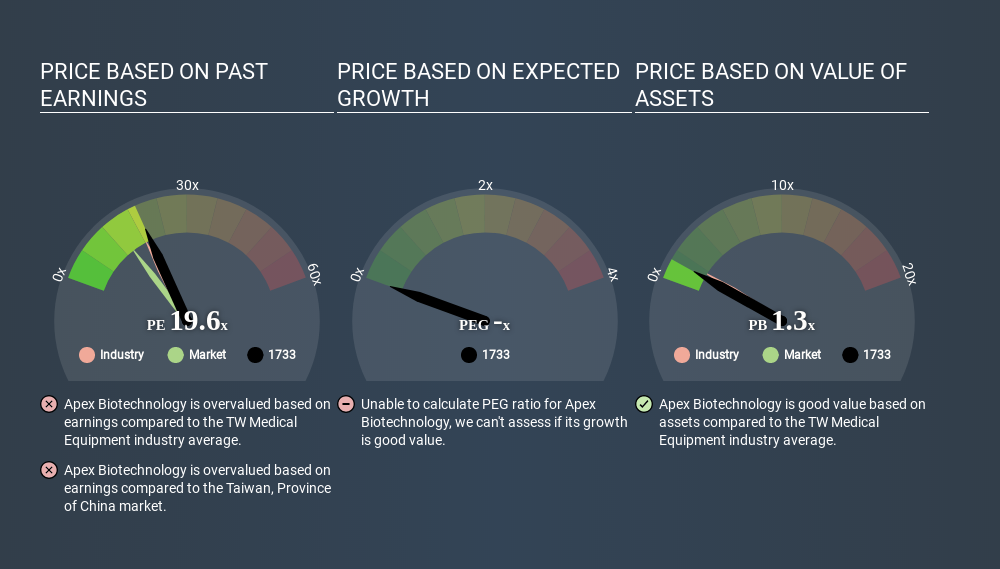- Taiwan
- /
- Medical Equipment
- /
- TWSE:1733
Here's What Apex Biotechnology Corp.'s (TPE:1733) P/E Is Telling Us
Today, we'll introduce the concept of the P/E ratio for those who are learning about investing. We'll show how you can use Apex Biotechnology Corp.'s (TPE:1733) P/E ratio to inform your assessment of the investment opportunity. Apex Biotechnology has a P/E ratio of 19.61, based on the last twelve months. That is equivalent to an earnings yield of about 5.1%.
Check out our latest analysis for Apex Biotechnology
How Do You Calculate A P/E Ratio?
The formula for P/E is:
Price to Earnings Ratio = Price per Share ÷ Earnings per Share (EPS)
Or for Apex Biotechnology:
P/E of 19.61 = NT$22.350 ÷ NT$1.140 (Based on the trailing twelve months to December 2019.)
(Note: the above calculation results may not be precise due to rounding.)
Is A High Price-to-Earnings Ratio Good?
The higher the P/E ratio, the higher the price tag of a business, relative to its trailing earnings. All else being equal, it's better to pay a low price -- but as Warren Buffett said, 'It's far better to buy a wonderful company at a fair price than a fair company at a wonderful price'.
Does Apex Biotechnology Have A Relatively High Or Low P/E For Its Industry?
The P/E ratio indicates whether the market has higher or lower expectations of a company. As you can see below Apex Biotechnology has a P/E ratio that is fairly close for the average for the medical equipment industry, which is 18.3.

Its P/E ratio suggests that Apex Biotechnology shareholders think that in the future it will perform about the same as other companies in its industry classification. So if Apex Biotechnology actually outperforms its peers going forward, that should be a positive for the share price. Further research into factors such as insider buying and selling, could help you form your own view on whether that is likely.
How Growth Rates Impact P/E Ratios
Earnings growth rates have a big influence on P/E ratios. That's because companies that grow earnings per share quickly will rapidly increase the 'E' in the equation. And in that case, the P/E ratio itself will drop rather quickly. So while a stock may look expensive based on past earnings, it could be cheap based on future earnings.
Apex Biotechnology increased earnings per share by an impressive 19% over the last twelve months. And earnings per share have improved by 229% annually, over the last three years. So one might expect an above average P/E ratio. Unfortunately, earnings per share are down 16% a year, over 5 years.
A Limitation: P/E Ratios Ignore Debt and Cash In The Bank
The 'Price' in P/E reflects the market capitalization of the company. So it won't reflect the advantage of cash, or disadvantage of debt. Hypothetically, a company could reduce its future P/E ratio by spending its cash (or taking on debt) to achieve higher earnings.
Such expenditure might be good or bad, in the long term, but the point here is that the balance sheet is not reflected by this ratio.
Apex Biotechnology's Balance Sheet
The extra options and safety that comes with Apex Biotechnology's NT$214m net cash position means that it deserves a higher P/E than it would if it had a lot of net debt.
The Verdict On Apex Biotechnology's P/E Ratio
Apex Biotechnology trades on a P/E ratio of 19.6, which is above its market average of 14.1. Its net cash position supports a higher P/E ratio, as does its solid recent earnings growth. So it does not seem strange that the P/E is above average.
Investors should be looking to buy stocks that the market is wrong about. If the reality for a company is better than it expects, you can make money by buying and holding for the long term. So this free report on the analyst consensus forecasts could help you make a master move on this stock.
Of course, you might find a fantastic investment by looking at a few good candidates. So take a peek at this free list of companies with modest (or no) debt, trading on a P/E below 20.
If you spot an error that warrants correction, please contact the editor at editorial-team@simplywallst.com. This article by Simply Wall St is general in nature. It does not constitute a recommendation to buy or sell any stock, and does not take account of your objectives, or your financial situation. Simply Wall St has no position in the stocks mentioned.
We aim to bring you long-term focused research analysis driven by fundamental data. Note that our analysis may not factor in the latest price-sensitive company announcements or qualitative material. Thank you for reading.
About TWSE:1733
Apex Biotechnology
Researches, develops, manufactures, and sells home care medical devices by using biosensor technology worldwide.
Flawless balance sheet with proven track record.
Similar Companies
Market Insights
Community Narratives


Recently Updated Narratives

TAV Havalimanlari Holding will fly high with 25.68% revenue growth


Fiducian: Compliance Clouds or Value Opportunity?


Q3 Outlook modestly optimistic
Popular Narratives


MicroVision will explode future revenue by 380.37% with a vision towards success


The company that turned a verb into a global necessity and basically runs the modern internet, digital ads, smartphones, maps, and AI.



